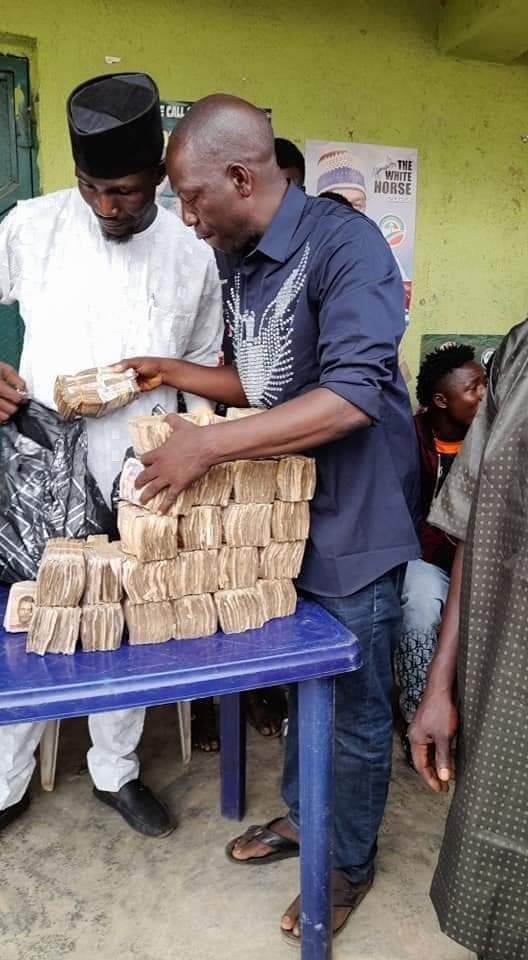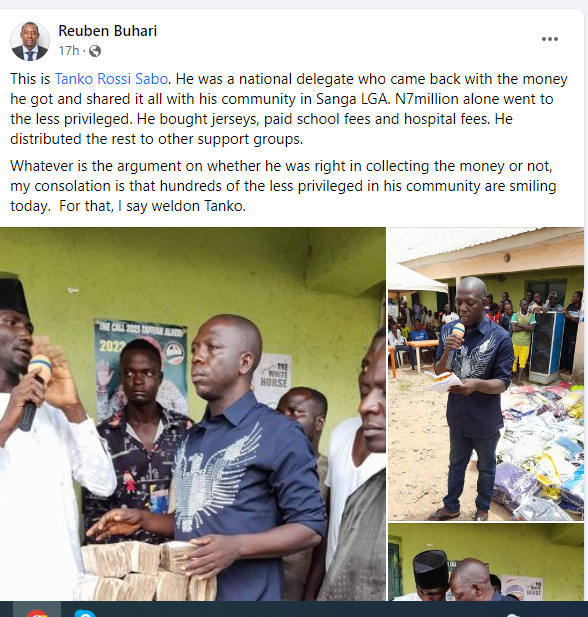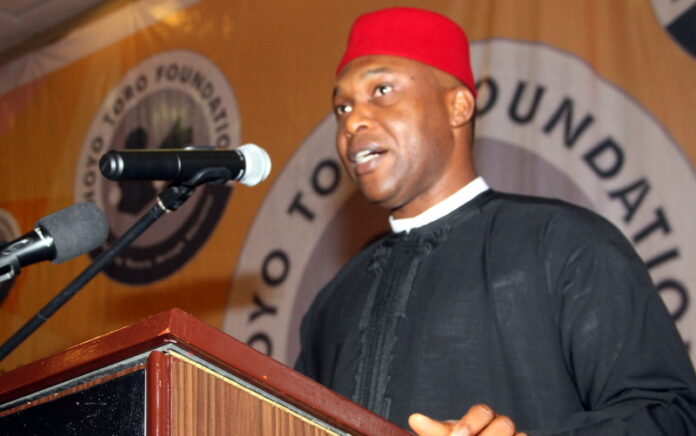Igbo PDP delegates failed to vote in high numbers for an Igbo aspirant
By Jeph Ajobaju, Chief Copy Editor
“Nobody in the country thought the Igbo quest for presidency was serious by the voting pattern at the [PDP] convention. None of the Igbo candidates could win a vote from outside of Igboland” – former Aviation Minster Osita Chidoka.
Orji Uzor Kalu was the first to press the All Progressives Alliance (APC) to pick Senate President Ahmad Lawan as its presidential candidate after the Peoples Democratic Party (PDP) elected former Vice President Atiku Abubakar as its candidate on 28 May.
Kalu, former Abia Governor, was simply too quick and too brazen to betray the cause of the South East.
And the conspiracy of Igbo PDP leaders against the Igbo Presidency Project has elicited concern from Chidoka, a senior member of the PDP from the South East, a zone that fails to unite itself yet demands support from others, then bemoans the lack thereof.
Kalu argued that only someone from the North East can beat Atiku in his domain. What Kalu – now a Senator – did not state was his ambition for Lawan to pick him as his running mate.
Kalu, like The Biblical Esau, is eager to sell out and to play second fiddle for a plate of porridge to the detriment of the collective aspirations of the South East.
It also does not bother him that he conspired with the North to cheat the South East out of its rightful presidential ticket of the PDP in the 2023 election cycle, based on the power rotation clause in the party’s constitution.
After the Johnson Aguiyi-Ironsi military junta, which lasted only six months from January to July 1966, no one from the South East, in military dictatorship or in democracy dispensation, has ruled Nigeria.
The propensity of South East leaders for the shameless politics of individualism, corruption, sleaze, and betrayal of their own people also shows in the decision of Abia Governor Okezie Ikpeazu to vote for Rivers Governor Nyesom Wike in the PDP presidential primary.
“I discovered that the conspiracy against the Igbo man is palpable. You can feel it, you can touch it,” he said on 3 June in explaining why he voted for Wike.
It is true that the major political parties are not keen on an Igbo becoming President. This cannot be justifiable for any reason. But Igbo political leaders share in the blame.
Ikpeazu’s explanation would have been logical if his discovery of “the conspiracy against the Igbo man” had spurred him to vote for an Igbo man in solidarity. He voted for the conspiracy instead of voting in protests against it.
That does not make sense.
_____________________________________________________________________
Related articles:
UPDATED: Atiku emerges PDP presidential candidate
Generous delegate shares money collected from PDP presidential aspirants with community
Orji Kalu goes on the offensive, says aspirants from South West, South South are hypocrites
_____________________________________________________________________


Presidential primary of bribery and corruption
The PDP conducted its presidential primary on the altar of corruption and financial inducement of the 767 delegates who voted.
Peter Obi and Mohammed Hayatu-Deen both said they withdrew from the contest because of the obscene amounts of bribe offered the delegates.
Some of the top contenders bribed each delegate with $5,000 or $10,000 or $20,000 depending on the war chest of the aspirant. One reportedly bribed them with $50,000 each.
Tanko Sabo, a Kaduna delegate to PDP state Assembly, National Assembly, and presidential primaries confirmed on social media on 2 June that he was bribed with a total N1.9 million, out of which he shared N7 million with his community.
Osita decried the betrayal of the Igbo Presidency Project by the Igbo in an article published in Vanguard on 5 June titled, “ZONING: No southerner did more damage than 80 of 95 Igbo delegates to PDP convention”.
The article is published below. Subheadings are added to aid comprehension:
Osita’s lament
No other group did more damage to the idea of zoning than the 80 out of 95 Igbo delegates to the last Peoples Democratic Party (PDP) convention who cast their votes against Igbo aspirants.
The 80 delegates and their sponsors, in a tragic display of lack of group consciousness and primacy of personal interest, sent the country a clear and loud message: zoning is not an issue dear to Ndigbo.
Igbo PDP delegates told Nigerians that a President from the South East is not a priority and not an issue of justice and fairness. The country heard them.
Two years ago, I approached [former Anambra] Governor Peter Obi, Senator Ike Ekweremadu, and [former] Senator Pius Anyim and spoke on the phone with [Ebonyi] Governor Dave Umahi with a single message – run for the presidency of the Federal Republic of Nigeria.
Obi, at two meetings, told me he would not like to run against Atiku Abubakar and would consider a run if the party zoned the presidency to the Southeast.
Ekweremadu expressed his preference for the Governorship of Enugu State. Anyim said he was watching the terrain, especially the zoning arrangement and would feed me back.
Umahi was non-committal. I continued the engagement as I believed that these men had sufficient name recognition and networks that would aid a competitive run.
My campaign on zoning
As time progressed, I started the campaign on zoning, calling on the country to respect a national agreement and convention. The campaign gathered steam as I traversed TV stations, online media, and radio stations, pushing the logic and rationale for zoning.
I was a member of the PDP zoning committee for Party Offices and used the platform to argue strongly for zoning the Chairmanship to the North. We achieved it but fell into a trap. We agreed to defer the decision on zoning elective offices.
After the zoning of the Chairmanship to the North, Anyim contacted me and confirmed that he would run. I was happy, and we went to work. I provided advice, went with him to solicit the support of some key stakeholders, and joined him in submitting his form at the PDP.
When I read online that Obi had declared, I reached out to him and provided him with some data about his standing across the regions from an opinion poll. I kept reaching out to him.
Sam Ohiabunwa visited with me and we discussed at length. I encouraged Anyim to convene the meeting of Igbo aspirants to create a platform that will ultimately help produce a consensus Igbo candidate.
Throughout the primary campaigns, I did not visit or attend any campaign event of Atiku, [former Senate President Bukola] Saraki, [Sokoto] Governor Tambuwal or [Bauchi] Governor Bala [Mohammed] save for when they came to speak to the Former Ministers Forum.
On principle and at personal pain, I stayed away from people who had continually shown me friendship because I believe that our nation must be built on foundations of justice and equity.
Two nights before the primaries, I joined an online meeting of select Igbo leaders. I passionately pleaded with them to endorse Anyim or Sam Ohuabunwa and make it public while reaching out to the Igbo PDP Governors and delegates to vote in one direction as a message to the country that Ndigbo are serious about zoning and fairness.
I feel humiliated
Atiku scored 371 votes which is three times more than the North East [delegates’] votes at 112 votes and more than 298 the combined votes of the North East and North West.
[Rivers Governor Nyesom] Wike scored 237, which was almost twice the vote from the South South. Saraki’s 70 votes indicate a strength beyond Kwara State, same for [Akwa Ibom] Governor Udom [Emmanuel’s] 38 votes.
Anyim got 14 votes, 13 clearly came from Ebonyi; and Ohuabunwa got one vote.
Fifteen votes from 95 delegates? The Igbo zone had no strategic interest in this election? No strategic objective? I feel bad. I feel humiliated not against Nigeria but against a group that could not come together in a rare moment of group consciousness to make a statement. Sad.
Nobody in the country thought the Igbo quest for presidency was serious by the voting pattern at the convention. None of the Igbo candidates could win a vote from outside of Igboland.
Last year when I lamented about the absence of a show of strength by Igbo presidential aspirants at the PDP convention, many took offence. Many Ndigbo disagreed with me when I said that the three most influential politicians in Nigeria were Goodluck Jonathan, Yemi Osinbajo and Atiku Abubakar. The evidence is playing out.
Igbo should re-engage at the national level
One can only become President of Nigeria through a national platform. President [Muhammadu] Buhari learnt that lesson and built a national coalition in 2015. Nnamdi Azikiwe, Aminu Kano, Obafemi Awolowo and Waziri Ibrahim all experienced it and tried to form a Progressive national alliance.
In 1979, the National Party of Nigeria, a national platform, delivered a largely unknown Shehu Shagari as President. Similarly, in 1993, the Social Democratic Party, a national platform, delivered MKO Abiola.
Furthermore, in 1999, the People’s Democratic Party a national platform, produced [Olusegun] Obasanjo despite lacking support from his region. The same portends for Jonathan, from the smallest state in Nigeria.
No politician will be elected President in Nigeria without a national platform. PDP is in danger of its national platform suffering serious erosion with Obi and [former Kano Governor] Rabiu Kwankwanso on the ballot. Who will profit from this erosion? I will deal with that soon.
From the ashes of this painful PDP outing, Ndigbo needs to rise and re-engage the country more positively.




